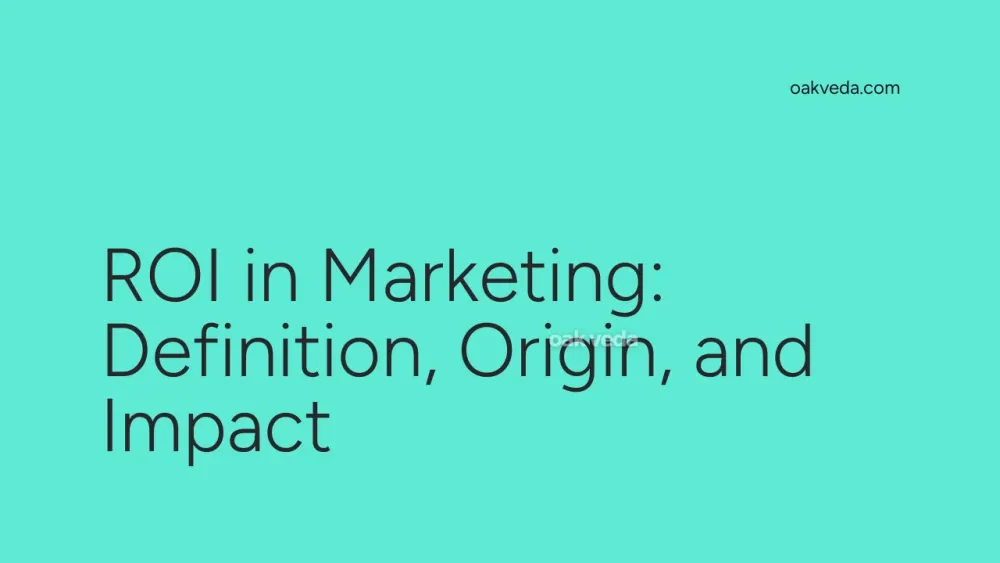
What is ROI in Marketing?
ROI in marketing, or Return on Investment, is a crucial metric used to evaluate the efficiency and profitability of marketing campaigns and strategies. It measures the revenue generated from marketing efforts relative to the costs incurred, typically expressed as a percentage. ROI helps marketers and businesses understand the value of their marketing initiatives and make data-driven decisions to optimize their strategies.
Origin and Development of ROI in Marketing
The concept of ROI has its roots in financial analysis but has become increasingly important in the marketing world. As businesses began to invest more heavily in marketing activities, especially with the rise of digital marketing, the need for a quantifiable measure of success became apparent. ROI in marketing evolved from simple sales metrics to a more comprehensive evaluation of various marketing channels and their impact on overall business goals.
How ROI in Marketing Works
Calculating ROI in marketing involves comparing the revenue generated from a specific marketing campaign or activity to its total cost. The basic formula is:
ROI = (Revenue - Cost) / Cost * 100
For example, if a campaign generates $10,000 in revenue and costs $4,000 to execute, the ROI would be:
ROI = ($10,000 - $4,000) / $4,000 * 100 = 150%
This means the campaign produced a 150% return on investment, indicating a successful and profitable marketing effort.
Types of ROI in Marketing
There are several types of ROI measurements in marketing:
- Financial ROI: The traditional measure of monetary returns versus costs.
- Social Media ROI: Evaluates the impact of social media marketing efforts on engagement, reach, and conversions.
- Content Marketing ROI: Measures the effectiveness of content creation and distribution in driving leads and sales.
- Email Marketing ROI: Assesses the performance of email campaigns in terms of open rates, click-through rates, and conversions.
- Influencer Marketing ROI: Calculates the return on partnerships with influencers, considering factors like reach, engagement, and sales generated.
Popular Examples of ROI in Marketing
-
Coca-Cola's "Share a Coke" Campaign: This personalized marketing campaign led to a 2% increase in U.S. sales, reversing a decade-long decline in Coke consumption.
-
Old Spice's "The Man Your Man Could Smell Like" Campaign: This viral video campaign resulted in a 107% increase in body wash sales within the first month.
-
Airbnb's Referral Program: By offering travel credits for referrals, Airbnb achieved a 300% year-over-year growth rate for signups and bookings.
Impact of ROI on Marketing Culture
The focus on ROI has significantly impacted marketing culture:
- Data-Driven Decision Making: Marketers now rely heavily on analytics and metrics to guide their strategies.
- Accountability: There's increased pressure to demonstrate the value of marketing activities to stakeholders.
- Agile Marketing: ROI measurements enable quick adjustments to campaigns based on performance.
- Budget Allocation: Resources are more likely to be directed towards high-ROI activities.
- Integration of Marketing and Sales: ROI encourages closer collaboration between marketing and sales teams to track leads and conversions.
Controversies Surrounding ROI in Marketing
While ROI is widely accepted as a valuable metric, there are some debates:
- Short-Term vs. Long-Term Impact: ROI often favors short-term results, potentially overlooking long-term brand building efforts.
- Attribution Challenges: In multi-channel marketing, it can be difficult to attribute success to specific activities accurately.
- Over-Reliance on Quantitative Metrics: Some argue that focusing too heavily on ROI can stifle creativity and risk-taking in marketing.
How Brands and Influencers Use ROI in Marketing
Brands use ROI to:
- Justify marketing budgets
- Compare different marketing channels
- Optimize campaign performance
- Demonstrate marketing's contribution to overall business goals
Influencers use ROI to:
- Prove their value to potential brand partners
- Negotiate better deals based on past performance
- Refine their content strategy to maximize engagement and conversions
Future Trends Related to ROI in Marketing
- AI and Machine Learning: Advanced algorithms will improve ROI predictions and automate optimization.
- Real-Time ROI Tracking: Technologies enabling instant ROI calculations will become more prevalent.
- Holistic ROI Measurements: Metrics will evolve to better capture both tangible and intangible returns on marketing investments.
- Customer Lifetime Value Focus: ROI calculations will increasingly consider long-term customer relationships rather than just immediate sales.
- Integration with Customer Experience: ROI metrics will expand to include customer satisfaction and loyalty indicators.
FAQs about ROI in Marketing
-
How often should I measure marketing ROI? Regularly, ideally monthly or quarterly, depending on your campaign durations and business cycles.
-
What's a good ROI for marketing? A positive ROI is generally good, but the ideal percentage varies by industry and campaign type. Many marketers aim for at least 5:1 ratio (500% ROI).
-
Can ROI be calculated for brand awareness campaigns? Yes, though it's more challenging. You can use metrics like increased website traffic, social media engagement, or brand recall surveys to estimate the value generated.
-
How can I improve my marketing ROI? Focus on targeted campaigns, optimize your marketing mix, leverage data analytics, and continuously test and refine your strategies.
-
Is ROI the only metric I should consider in marketing? While important, ROI should be balanced with other metrics like customer satisfaction, brand equity, and market share to get a comprehensive view of marketing performance.
By understanding and effectively utilizing ROI in marketing, businesses can make more informed decisions, allocate resources wisely, and ultimately drive greater success in their marketing efforts.
You may be interested in:
- Social Media: Definition, Origin, and Impact
- "I'm Dead": Definition, Origin, and Impact on Social Media
- Girlfriend Effect: Definition, Origin, and Impact
- Featured Banner: Definition, Origin, and Impact on Link in Bio
- Stitch: Definition, Origin, and Impact on TikTok
- Watch Time: Definition, Origin, and Impact on YouTube Success

